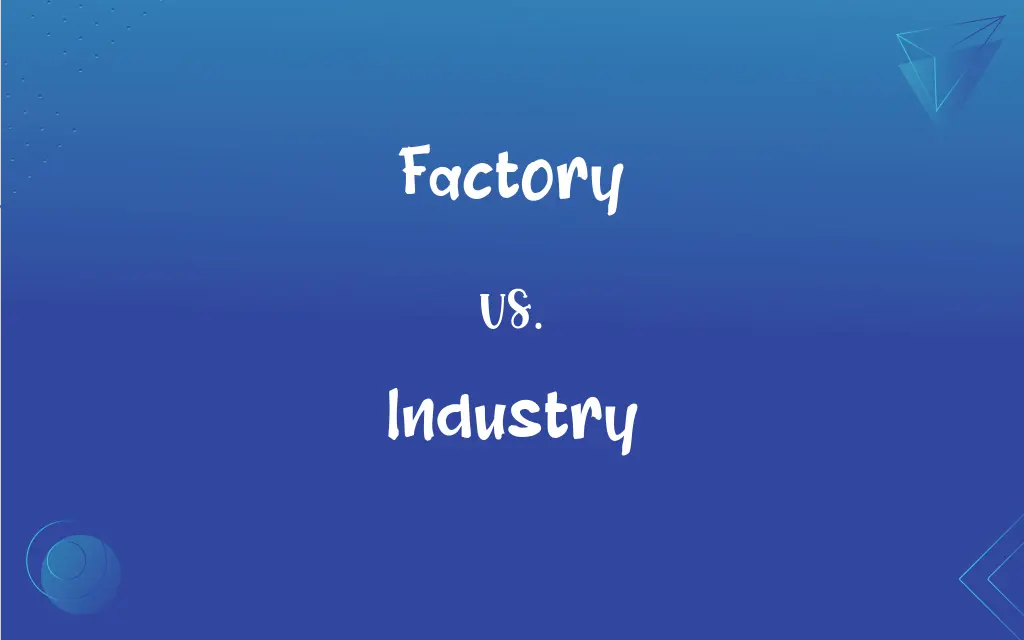Factory vs. Industry: What's the Difference?
Edited by Aimie Carlson || By Harlon Moss || Updated on October 5, 2023
A factory is a building where goods are manufactured, while an industry refers to a sector of economic activity concerned with production of goods or services.

Key Differences
When considering the economic and physical landscapes of manufacturing and production, it's crucial to understand the nuanced differences between a factory and an industry. A factory can be described as a specific physical space or structure wherein workers manufacture goods or oversee the manufacturing process using machines, tools, and other equipment. This pertains to a place where tangible items, such as automobiles, textiles, or electronics, are produced.
Conversely, the term industry speaks to a much broader and encompassing aspect of economic activity. Industry doesn’t refer to a single physical space but denotes a sector or collection of companies and activities related to a particular type of production or service. It spans various fields and specialties, such as the technology industry, the healthcare industry, or the automotive industry, highlighting a broad category of closely related economic activities.
It's pertinent to recognize the role of a factory as a subset within an industry. While a factory relates to the physical and operational aspects of producing goods, an industry relates to the entire realm of that particular kind of economic activity, which can span across countries and continents. Factories are essentially components or individual entities that exist within a larger industry.
Meanwhile, industries categorize and generalize the economic segments within which factories operate. Industries can be local, regional, or global, implying that the actions, developments, and trends within an industry can have far-reaching implications on the economy, employment, and market movements at various geographical scales.
In summary, while a factory is inherently physical and specific, focused on the production of goods within a confined space and operational scope, an industry is abstract and wide-ranging, representing a collective economic activity across various regions. The terms are interconnected yet distinguishably different, with factories serving as tangible units within the expansive, overarching domain of an industry.
ADVERTISEMENT
Comparison Chart
Definition
A building or set of buildings where goods are manufactured.
A categorized group of companies related to a specific economic activity.
Scale
Pertains to a specific, localized place.
Can be localized, regional, or global in context.
Scope
Concerned with the production of goods.
Encompasses production, distribution, and various related activities.
Physicality
Has a physical presence.
Represents an economic sector without physical confinement.
Role
Plays a role as a unit within an industry.
Includes various units (like factories) within its scope.
ADVERTISEMENT
Factory and Industry Definitions
Factory
A building where goods are manufactured.
The factory produces thousands of shoes each day.
Industry
A sector of an economy involving specific goods or services.
The technology industry has witnessed exponential growth in recent years.
Factory
An establishment for traders or manufacturers.
The factory owner ensured safe working conditions for all employees.
Industry
May refer to manufacturing, service, or other economic sectors.
The entertainment industry contributes significantly to cultural expressions.
Factory
A place where workers create products.
Workers at the factory assemble the devices meticulously.
Industry
A collective of companies and activities in a particular production field.
The automotive industry encompasses manufacturers, suppliers, and dealers.
Factory
Involved directly in the production of goods.
The factory uses various machines to enhance production efficiency.
Industry
Involves production, distribution, and sale within a sector.
The pharmaceutical industry plays a pivotal role in global health.
Factory
Can be owned by individuals or companies.
The factory was sold to a large conglomerate last year.
Industry
Characterized by related economic activities.
The healthcare industry is crucial for societal well-being and development.
Factory
A building or group of buildings in which goods are manufactured; a plant.
Industry
The sector of an economy made up of manufacturing enterprises
Government regulation of industry.
Factory
See factory ship.
Industry
A sector of an economy
The advertising industry.
Factory
A business establishment for commercial agents or factors in a foreign country.
Industry
Energetic devotion to a task or an endeavor; diligence
Demonstrated great intelligence and industry as a prosecutor.
Factory
The source of prolific production
A rock group that was a hit-tune factory.
A motel that served as an illegal drug factory.
Industry
Ongoing work or study associated with a specified subject or figure
The Civil War industry.
The Hemingway industry.
FAQs
What is primarily produced in a factory?
Goods or products are primarily produced in a factory.
How is industry defined?
Industry refers to a sector or collection of related economic activities or companies.
Is a factory’s operation limited to a physical space?
Yes, a factory operates within a defined physical space where production occurs.
How do factories contribute to industries?
Factories contribute to industries by producing goods and adding economic value within the sector.
Is size a defining factor for a factory?
No, factories can vary in size and still serve their primary function of producing goods.
What is a factory?
A factory is a physical place where goods are manufactured or assembled.
How is globalization related to industries?
Globalization enables industries to operate, trade, and influence across international borders.
Can an industry include services?
Yes, an industry can include various sectors, including services.
What activities take place in a factory?
Activities like manufacturing, assembling, and producing goods take place in a factory.
Can a factory exist without an industry?
A factory produces specific goods and implicitly relates to a wider industry, though theoretically, it can exist independently.
Can an industry span across countries?
Yes, an industry can have a presence and impact across multiple countries.
Are factories only involved in manufacturing?
While factories are predominantly involved in manufacturing, they may also engage in related activities like assembling and processing.
Do industries only pertain to manufacturing sectors?
No, industries can pertain to various sectors like services, technology, healthcare, and more.
Is the technology sector considered an industry?
Yes, the technology sector is considered an industry.
How does an industry impact the economy?
An industry impacts the economy by contributing to GDP, employment, and market dynamics.
What is the role of regulation in industries?
Regulation in industries ensures fair practices, safety, and adherence to laws.
How do trends within an industry affect related factories?
Trends in an industry can affect factories in terms of demand, production, and operational strategies.
Can a factory be a part of an industry?
Yes, a factory is considered a unit or entity within a larger industry.
Who typically owns factories?
Factories can be owned by individuals, companies, or governments.
What elements comprise an industry?
An industry comprises companies, markets, and economic activities related to a particular field.
About Author
Written by
Harlon MossHarlon is a seasoned quality moderator and accomplished content writer for Difference Wiki. An alumnus of the prestigious University of California, he earned his degree in Computer Science. Leveraging his academic background, Harlon brings a meticulous and informed perspective to his work, ensuring content accuracy and excellence.
Edited by
Aimie CarlsonAimie Carlson, holding a master's degree in English literature, is a fervent English language enthusiast. She lends her writing talents to Difference Wiki, a prominent website that specializes in comparisons, offering readers insightful analyses that both captivate and inform.
































































